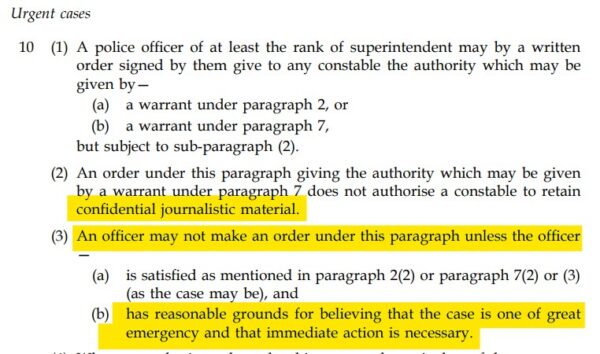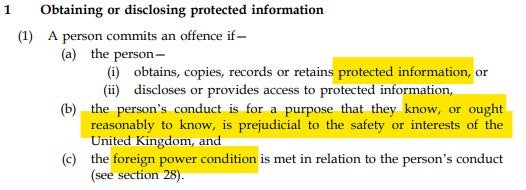The UK’s National Security Bill threatens to “criminalise” public interest journalism and whistleblowing, news publishers and press freedom campaign groups have warned.
In its current form, the bill – which is advancing through Parliament after being introduced by Priti Patel’s Home Office in May – is also set to water down protections against police accessing journalistic materials.
Campaign groups are concerned about a clause in the bill that may threaten journalists for foreign state-funded broadcasters, including from “friendly states”, with prison time for reporting on leaked information.
Guardian News and Media, the News Media Association (NMA), whistleblowers charity Protect, the Campaign for Freedom of Information and Article 19 have each made submissions to the Government that identify a plethora of serious issues with the legislation.
The priority of most of these organisations is for the Government to include a public interest defence clause. Without one, these groups fear the National Security Bill threatens to “criminalise” some investigative journalism and “chill” whistleblowing.
In a submission to the Government seen by Press Gazette, Guardian News and Media said: “The only safeguard for whistleblowers and journalists in the draft bill is that the Attorney-General has to consent to prosecutions and also that the Crown Prosecution Service has to consider that prosecution is in the public interest.
“The DPP [Director of Public Prosecutions] guidance holds no legislative force, therefore the decision to prosecute would be in the hands of a Minister of State or the DPP, rather than a proper statutory safeguard.
“This is particularly concerning given the draft bill does not require disclosures to have actually harmed the UK national interests in order to be a criminal offence. An actual harm requirement should be added to the bill to safeguard freedom of expression.
“There should also be an explicit statutory prior publication defence to protect those who publish information that is lawfully in the public domain or widely disseminated to the public.”
What is the National Security Bill?
The National Security Bill is intended to replace outdated counter-espionage laws from the Official Secrets Acts (OSA) of 1911, 1920 and 1939. It does not amend the OSA of 1989, which relates to unauthorised disclosures of information.
The bill was drawn up following a Law Commission review of the Official Secrets Acts in 2015. The Law Commission’s report made a series of recommendations, including that “archaic” words such as “enemy” should be replaced in legislation with “foreign power”.
The Law Commission recommended that there should be a statutory public interest defence for anyone, including journalists and civilians, charged with unauthorised disclosure offences under the OSA of 1989.
Public interest defence concerns
However, the National Security Bill in its current form does not contain a public interest defence.
In late October, Sayra Tekin, the NMA legal director, wrote to Tom Tugenhat, minister of state for the Home Office, to share the news industry’s concerns. Primary among them was the lack of public interest defence.
“The current omission marks a grave oversight and would create an unworkable balance which would threaten public accountability and will likely have a chilling effect on investigative journalism,” she said.
A spokesperson for Guardian News and Media said: “The lack of a statutory public interest defence and the extremely harsh criminal penalties mean the draft National Security Bill threatens to chill whistleblowing, undermining public access to information and the democratic role of high quality journalism in the UK.
“It is vital that the government follows the advice of its own Law Commission and places a statutory public interest defence at the heart of the bill in order to protect public interest journalism and freedom of expression.”
Why the Government appears unlikely to budge
Protect, the Campaign for Freedom of Information and Article 19 are all calling for the introduction of a public interest defence in the National Security Bill.
Parliament’s Joint Committee on Human Rights acknowledged in a report last week that there “seems to be a certain level of consensus that a whistleblowing or public interest defence is needed” and called on the Government to address this issue.
Kevan Jones, a Labour MP, has tabled an amendment to the bill that would create a public interest defence.
However, the news industry and other groups are concerned that the Government will not adopt the amendment or listen to their concerns.
“The National Security Bill lays out a whole new set of offences,” Andrew Pepper-Parsons, head of policy at Protect, told Press Gazette. “We’re not disputing that those offences should exist and that this is an area of concern that should be tightened up. It’s just that there needs to be a public interest defence.”
He added: “I’m not hopeful that the Government are going to implement what we’re suggesting, which is a public interest defence, unfortunately.”
Is a public interest defence required?
In a statement to Press Gazette, a Home Office spokeperson argued that a public interest defence is not required in the legislation.
“The offences in the National Security Bill target harmful activity by states, not leaks or whistleblowing activity,” they said.
“There are already safeguards which prevent this bill capturing whistleblowers which negate the need for a public interest defence.”
The news industry, free speech campaign groups and some legal experts disagree with this assessment.
In a briefing document drawn up by Mischon de Reya and Matrix Chambers, lawyers argued that existing defences to OSA offences are “contrived and already involve the public interest creeping in by the backdoor”.
The briefing said: “For OSA offences in which damage must be proved, it is a defence for the accused to show that s/he did not know and had no reason to believe that the disclosure was damaging or likely to be. This can result in bizarre, Spycatcher-type arguments, where the defence may point to prior publication of the substance of the disclosure, which is not itself a defence but may establish that no harm was done by the revelation…
“The other main defence is necessity (a defence to all crimes except murder). This is a crude form of public interest where the defendant can establish that the offence of disclosure involved a lesser harm than the crime it sought to prevent.”
The NMA said in its own briefing document to the Government that a “statutory public interest defence is essential” to ensure that individuals are not reliant on the “discretion of the Attorney General, Director of Public Prosecutions or Crown Prosecution Service not to bring proceedings, or upon their interpretation of guidance that can be varied at any time”.
Police access to journalistic material
The insertion of a public interest defence clause is a priority for the journalism industry. But publishers have several other concerns with the legislation.
Both the NMA and Guardian News and Media have raised flags with the Government over a section of the act that apparently waters down protection of journalistic material.
Currently, under the Police and Criminal Evidence Act (PACE) police forces must apply to a court to inspect “special procedure material”, which includes journalists’ notebooks and electronic files.
The National Security Bill, in its current form, would allow a police superintendent to authorise search warrants and inspection, but not seizure, of journalistic material where they have “reasonable grounds for believing that the case is one of great emergency and that immediate action is necessary”.

The Home Office believes schedule two, paragraph 10 of the act is essential to help police take emergency action when required.
The Guardian briefing note said: “The draft bill expands the powers granted under the terrorism legislation and appears to reduce the protections for journalistic material under PACE.
“GNM considers that all journalistic material should have the same level of protection in the draft bill and that all inspection should be subject to a court order having been made.”
Broad definitions and state broadcasters
The Campaign for Freedom of Information and free speech campaign group Article 19 have raised issue with clause one of the bill (below) that they say could imperil journalists working for non-UK state broadcasters.

The organisations are concerned that the definitions of “protected information”, “prejudicial to the safety or interests of the United Kingdom” and “foreign power condition” are too broad. They believe that the bill, in its current form, “criminalises matters that do not involve espionage, sabotage or other hostile actions by or on behalf of foreign states”.
In their briefing document, the Campaign for Freedom of Information and Article 19 warn: “A journalist working for another government’s state broadcaster – including that of a friendly state – who reports on a leak of protected information which is held to be prejudicial to the UK’s interests, would also [in addition to civil society organisations that receive foreign government funding] commit an offence under the bill if they knew or ought to have known that the broadcast would prejudice the UK’s safety or interests.
“The fact that the journalist was paid for from the funds of a foreign government department or agency and that the broadcasting organisation itself was financed by such funds would satisfy the foreign power condition. They would also face a maximum sentence of life imprisonment.
“A journalist working for a UK news organisation responsible for an identical report based on the same leak could not commit this offence because the foreign power condition would not apply.”
The Guardian is concerned that the bill could disrupt its journalistic collaborations with international news organisations that receive donations from foreign states.
The Guardian’s briefing note to the Government said: “A public interest defence should be added to ensure that such international collaborations between journalists across the world are not potentially criminalised. Safeguards need to be added to the draft bill so that financial assistance from a foreign state alone does not tip the balance as to whether a criminal offence may have been committed.”
Other concerns of the news industry
The NMA also backs the introduction of an independent statutory commissioner to support whistleblowers, as first recommended by the Law Commission.
The NMA believes the commissioner could “act expeditiously on whistle-blowers’ concerns without improper influence from government bodies”.
The Guardian shared concerns in its briefing note about potential powers of the government to impose restrictions on “prohibited sites”.
The news group believes the law could “make it a criminal offence if journalists are merely overlooking a prohibited place from public property which journalists have a legitimate right to access or ‘inspecting’ a prohibited place (taking photographs or videos of a prohibited place or inspecting photographs of a prohibited place including photographs taken by drone or even possibly by other people) if the conduct is for a purpose ‘that the person knows or ought reasonably to know is prejudicial to the safety or interests of the United Kingdom’”.
A spokesperson for the Home Office said: “The National Security Bill brings together vital new measures to protect our national security.”
“It completely overhauls and updates our outdated espionage laws; but more than that it creates a whole suite of measures to enable our law enforcement and intelligence agencies to deter, detect and disrupt the full range of modern-day state threats.”
“The offences in the National Security Bill target harmful activity by states, not leaks or whistleblowing activity. There are already safeguards which prevent this Bill capturing whistleblowers which negate the need for a public interest defence”.
Picture: Shutterstock
Email pged@pressgazette.co.uk to point out mistakes, provide story tips or send in a letter for publication on our "Letters Page" blog
